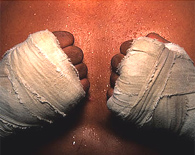I came out of the closet six years ago, but I've just recently realised what "gay brotherhood" really means and how empowering it can be.

Vitaya Saeng-Aroon, founder of a Bangkok-based support group for gay men, hopes to help gay men come out, overcome their residual internalised homophobia and increase their self-esteem.
I just wanted to get to know my real self and my new world in all its different settings. It took me a while to overcome the residual homophobia in me. I started to learn how to increase my self-esteem.
Going through the encounters, I found the spirit of being different, which produced some interesting creativity and productivity. I found the spirit in other gay and lesbian people who were no longer ashamed of the nature of their sexuality and came forth to stand up for others.
But I could not find strength. I still felt vulnerable.
Recently, though, at the urging of my dear friends, I finally managed to take a little step - by setting up a support group for Thai gay men. It's probably the first of its kind in this country.
I'd had some experience organising public events for the gay audience, such as celebrity interviews and academic talks before, but running a private, exclusive and secretive meeting for a small group of gay men proved nerve-wracking.
I found myself in the dark.
The tough part was creating a safe space for the audience and making them feel comfortable enough to talk about themselves. At least my audience was made up of people still deep inside the closet, just as I had been, so I knew I shouldn't be so nervous.
You would rarely find these people striding along at Silom. They were the type we called "invisible." They were good employees and the pride of their families - but they never had pride in themselves.
People need to talk to "discharge" their feelings and learn from one another, and thus find their own solutions. Every problem has a solution, and while coming out of the closet is painful, it is also rewarding.
But in starting a group, I fretted. What if they gathered and hated each other? What if they found it boring and left?
My first group had about a dozen men, aged 23 to 50 and when it expanded unexpectedly to 19, it was too large to allow everyone to talk equally. My friends who helped organise the session nevertheless felt a joy in the crowd.
The group grew because there were around 50 people in a waiting list who wanted to meet with like-minded people. The turnout boosted my courage considerably.
"The Get-Together of Someone Who Has No (Gay) Friends" encouraged people to talk openly about their encounters with homophobia at home, school and work. Participants told of their struggles to come out to their friends and, for some, to their families. They could share their worries about the future and, of course, their search for love.
Many told us they felt free for the first time in their lives by talking about their feelings without fear of scornful looks. After the initial awkwardness, to my surprise, everyone wanted to meet again, and I saw a sparkle in their eyes when we organisers agreed to arrange another get-together.
Last month the first group met four times, each session lasting close to three hours. Plans were made for some small workshops to learn more about ourselves and overcome the stigma.
Most of all, we learned from each other how to be happy despite being unable to overcome restrictive social and familial expectations.
Members of the first group began to hang out together without the organisers. They took their own initiative to do things together and supported one another emotionally.
What really connected these strangers in such a short period of time was their shared experience of the same fear. There was little they had to explain at length to each other. It was a bonding they could never find among their straight friends and co-workers.
For my part, I felt my life was much more important and my emotions much more stable. I felt a warmth inside when I saw them laughing and listening to each other.
It's been empowering to me to do this for strangers - who have now become my brothers.
I encourage anyone who is open and enjoys volunteer work to join us. There should be more than one support group for gay men but many - since we are everywhere.
Vitaya Sang-Aroon and his friends are regularly organising a gay-men support group program in Bangkok for Thais and non-Thais. He can be reached at vitadam2002@yahoo.com. This article was first published in The Nation newspaper and is republished on Fridae with the author's permission.











 Printable Version
Printable Version












Reader's Comments
Be the first to leave a comment on this page!
Please log in to use this feature.